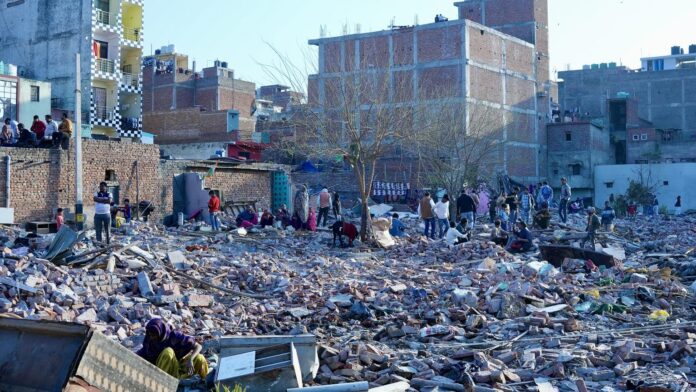
With Narendra Modi’s third term as Prime Minister, concerns grow about climate-vulnerable minorities in India, particularly Muslims. His election campaign openly targeted Muslims, fanning the growing Islamophobia across India and exacerbating ongoing housing apartheid in many cities across the country, particularly in Delhi, the National Capital Region (NCR). This has forced many Muslims to move into ghettos without basic infrastructure like power, clean water and sanitation, increasing their vulnerability to extreme climate impacts notably rising temperatures and heat waves.
Housing Apartheid in Delhi, the NCR
Delhi’s landscape is increasingly marred by a housing apartheid, fueled by a surge in Islamophobia. An example of the housing apartheid is evident in the town of Jamia Nagar, where, south of Delhi, the Muslim population survives without basic amenities and public services, deeming it a ‘Muslim ghetto’. Traditionally, ghettos are inhabited by disenfranchised communities undergoing oppression by the state.
Through various business practices by brokers and agents, the housing divide is maintained and upheld in the NCR. Landlords and brokers will often refuse to accommodate Muslim families when seeking housing in largely Hindu areas. Brokers will often direct these tenants overtly toward areas with a high-Muslim majority by telling them no other houses are available. Brokers also decide where to place tenants based on their names, revealing their religious identity and enabling discriminatory practices. Locals report that Hindu families tend to relocate when Muslim families move into their neighbourhoods, expressing a preference to live in a “safe place where there are no Muslims”.
As a result of this ongoing housing apartheid and growing fears of religious discrimination and attacks, Muslims are evacuating Hindu-majority posh areas to move to Muslim-majority ghettos, like Jamia Nagar, an area in South Delhi with limited access to basics such as running water and electricity, for fear of persecution. With recent extreme weather experienced in India, access to drinking water is vital for preventing heat strokes, yet 95.1% of people in these ghettos struggle to obtain the necessary water to stay cool during the summer. The absence of adequate housing and basic resources leaves Muslim minorities in India disproportionately affected by climate change.
Islamophobia Exacerbating Climate Vulnerability
Since PM Modi and his Bharatiya Janata Party (BJP) came to power in 2014, hate crimes against religious minorities have soared, with new discriminatory laws and policies constantly being implemented. Under this Hindu nationalist (or Hindutva) government, the use of bulldozers to demolish Muslim properties has become disturbingly common, echoing tactics used in the Israeli occupation of Palestine. Hindutva forces believe that Muslims have no rightful place in India, a sentiment propagated by the Rashtriya Swayamsevak Sangh (RSS). These demolitions, including mosques and Muslim-owned shops, are carried out under false pretenses of removing “illegal and unauthorized buildings”, forcing many Muslims into ghettos lacking essential services to protect against rising climate impacts.
Muslim ghettos across India are plagued by inadequate infrastructure. A significant portion of these communities live without access to clean water and reliable electricity. Schools and parks are also scarce, with most areas lacking sewage or waste management systems. Delhi is experiencing rising temperatures and extreme weather events, exacerbated by urban factors like construction, traffic, and a lack of green spaces. Temperatures have been recorded at a high of 52.3°C (126.1°F). For Muslims living in inadequate housing, these extreme conditions pose severe physical health risks. Proper housing plays a crucial role in protecting individuals from the adverse effects of heat and climate change. Yet, many Muslim ghettos lack this fundamental protection – affecting their mental health as well.
The discrimination and segregation Muslim communities endure limit their access to resources and support, making them more vulnerable to extreme weather events and rising temperatures. Studies estimate that 17.8% of all annual deaths in India are due to air pollution. Mass displacement is another by-product of the climate crisis, whereby annual floods, heatwaves, and air pollution cause unbridled disruption to communities, affecting millions.
Climate Justice in India
In his recent book, Climate Justice in India, author Prakash Kashwan found that the “urban poor, Dalits, Adivasis, Muslims, and other marginalized people with little political voice”, are worst hit by air pollution and the climate crisis across India. With a lack of coverage in the national media, the effects of the climate crisis unfairly borne by these groups are largely denied and ignored.
The deadly intersection of housing apartheid amidst rising Islamophobia in Delhi, the NCR and across India is pushing Muslim communities into ghettos, where they face disproportionate impacts of climate change. Addressing these intertwined issues requires integrated efforts focusing on improving living conditions, combating discrimination, and enhancing climate resilience. Without acknowledging and acting on these intersectional challenges, particularly rising Islamophobia and its implications on the climate-vulnerable communities, India cannot deliver a more just and equitable society for all.


